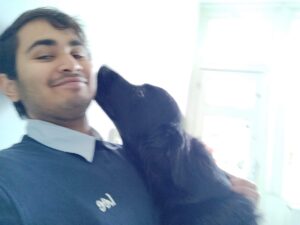September 2020 was a time like any other. Except it wasn’t. COVID-19’s six-month anniversary also earmarked my first month interning at Goeiezaak, a digital marketing agency in Haarlem. From traveling daily between towns during a pandemic to doing so with a sprained ankle, my first month was eventful.
I had responded to a Dutch listing with a long email in English so I was surprised to get the job ten minutes into the interview. Turns out, in my state of last-minute panic I had displayed my agency and will to a young organization that was looking for an independent learner. Though most of my first month involved reading, planning and naming my new plant, the impending restrictions soon created distance between me and Groot.
Just as soon I had received my first ghost-writing assignment, the half-week began- I would work from the office every other day and continue my work digitally at home the others. Here I was, writing real content, for Accenture, a real company, in a virtual office with very little opportunity to discuss my work. My panic soon subsided thanks to my supervisor’s professionalism and keen sense to pick up on my lingering anxiety. Within the second week of distanced working, I began meeting with my supervisor more often to discuss the work I had provided our clients.
Since most of my writing contributed to Accenture’s blog, I was incredibly intimidated by the prospect of writing about a technical topic on behalf of a technical expert on a platform intended for technical experts. With the supportive shoulders of YouTube videos and thesaurus.com, I breezed through the first 1500 words in a day and was elated to see that it satisfied the requirements.
There are significant similarities in the approach to corporate and academic writing – context is key, empirics are your guiding light and your argument is only as good as your structure. There are also significant differences. Despite facing the need to cater to a technical audience, I learned that this audience defers from the academic community in one key way – you have to buy their attention. As my awareness of my audience seeped into my writing, multiple drafts dragged from version 2s to version 7s, requiring repeated optimization to engage readers. Levity in tone and brevity in style go hand in hand. This balance required weeks of rewriting for me to train myself into but once I did, I was enjoying reading my own work!
If you asked me a year ago what I’m proudest of writing, ten thousand words on cloud computing wouldn’t have even been in contention. But my most challenging project demanded me to explain and re-explain, creating an engagement with content I can only describe as immersion. Two-hour long calls ranting about servers and digital architectures became highlights of my work-from-home experience, showing me new things that always existed around me. Once that internal motivation started running low, I had the tremendous fortune of meeting the office’s happiness manager.
Apart from Bauke, this was the primary reason I enjoyed my internship: my work was fun to interact with so even when I wasn’t receiving feedback, I was learning. So much so that I am continuing writing for my internship organization as a freelancer now. As frustrating as working from home was, it provided me an invaluable experience by letting me accidentally do the job I wanted to do all along. Working at the office would involve a significantly more hands-on approach with my supervisor, but the distance often required me to connect dots myself.
As steep as that learning curve was, I am still enjoying and adapting to its ascent and I can only hope that everyone reading finds similar inspiration from their internship. The task of entering adulthood is now well before me, and my experiences at Goeiezaak have lent me a hand in confidently taking that step.




Leave a Reply